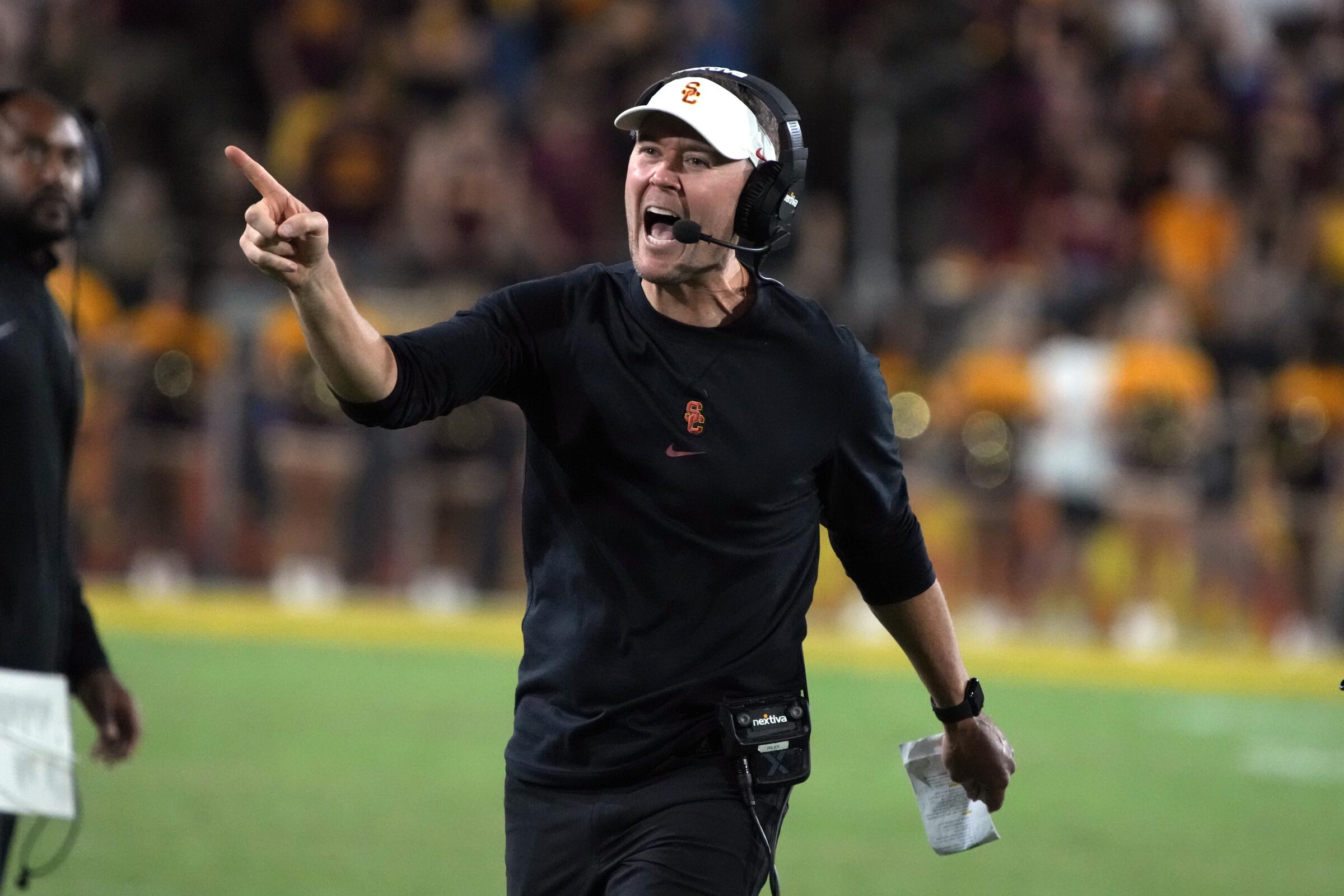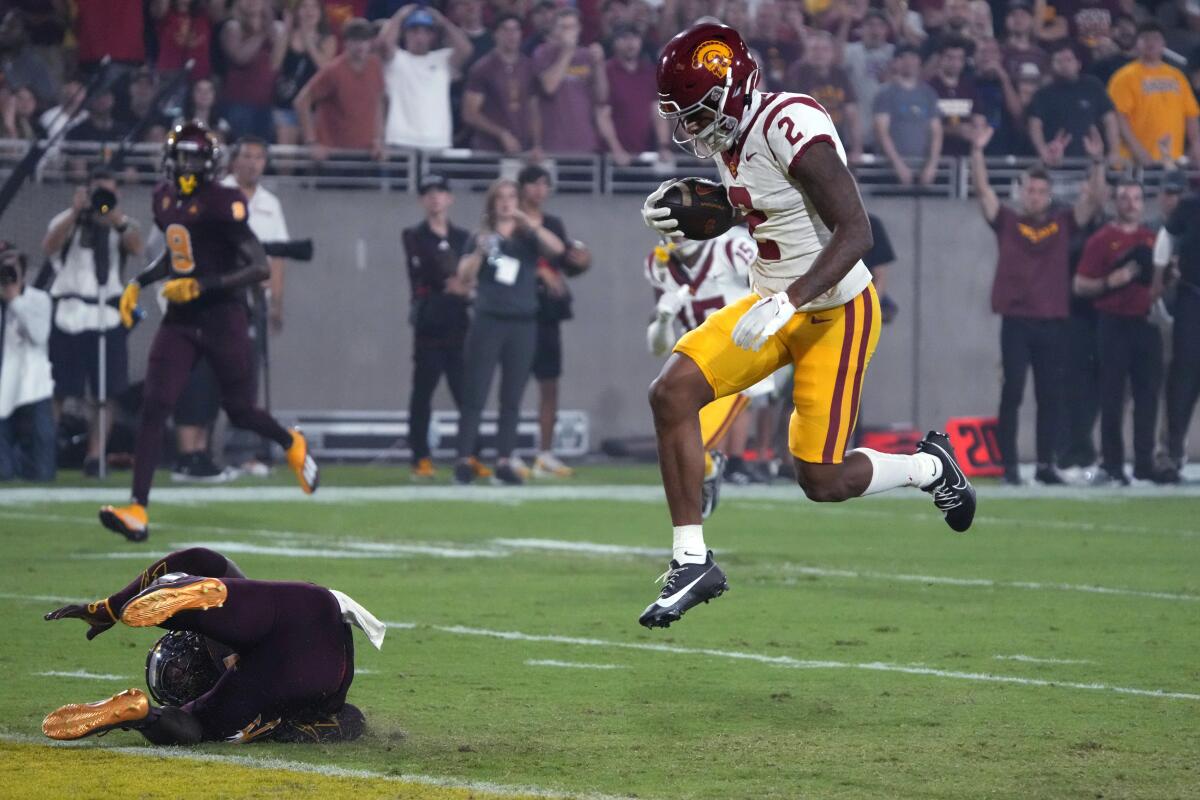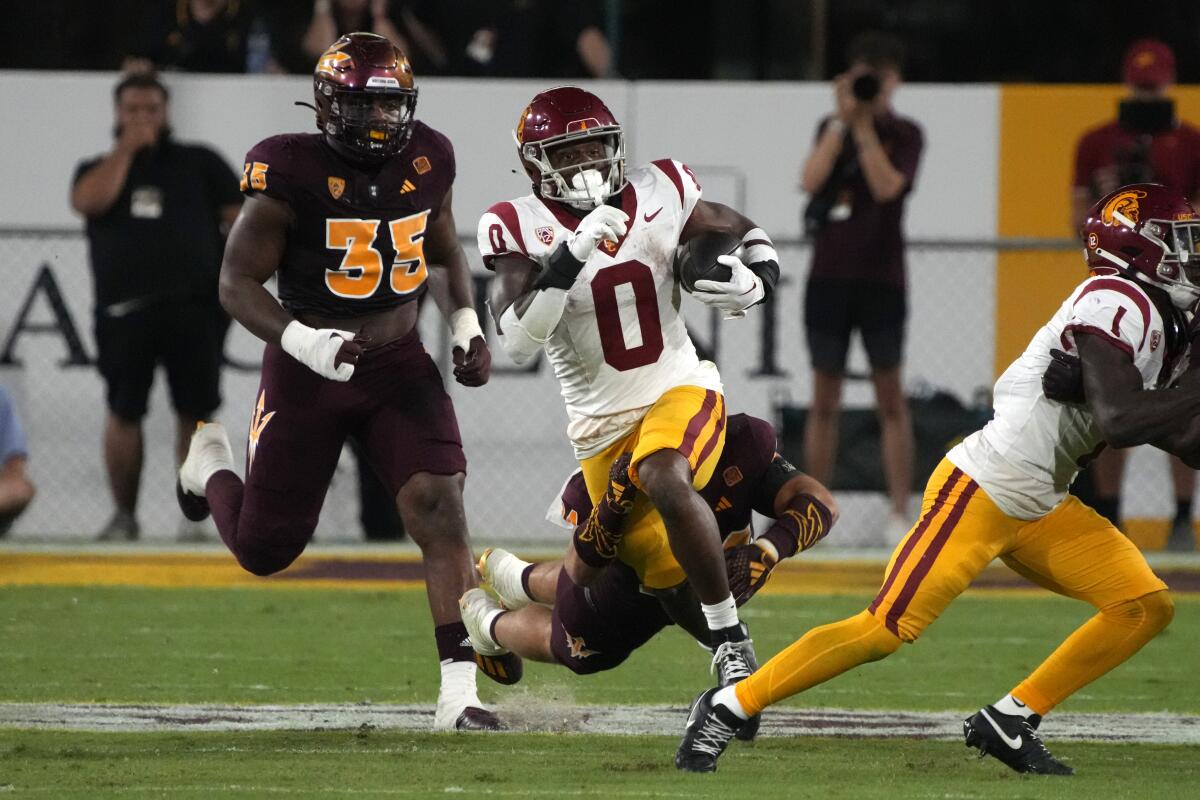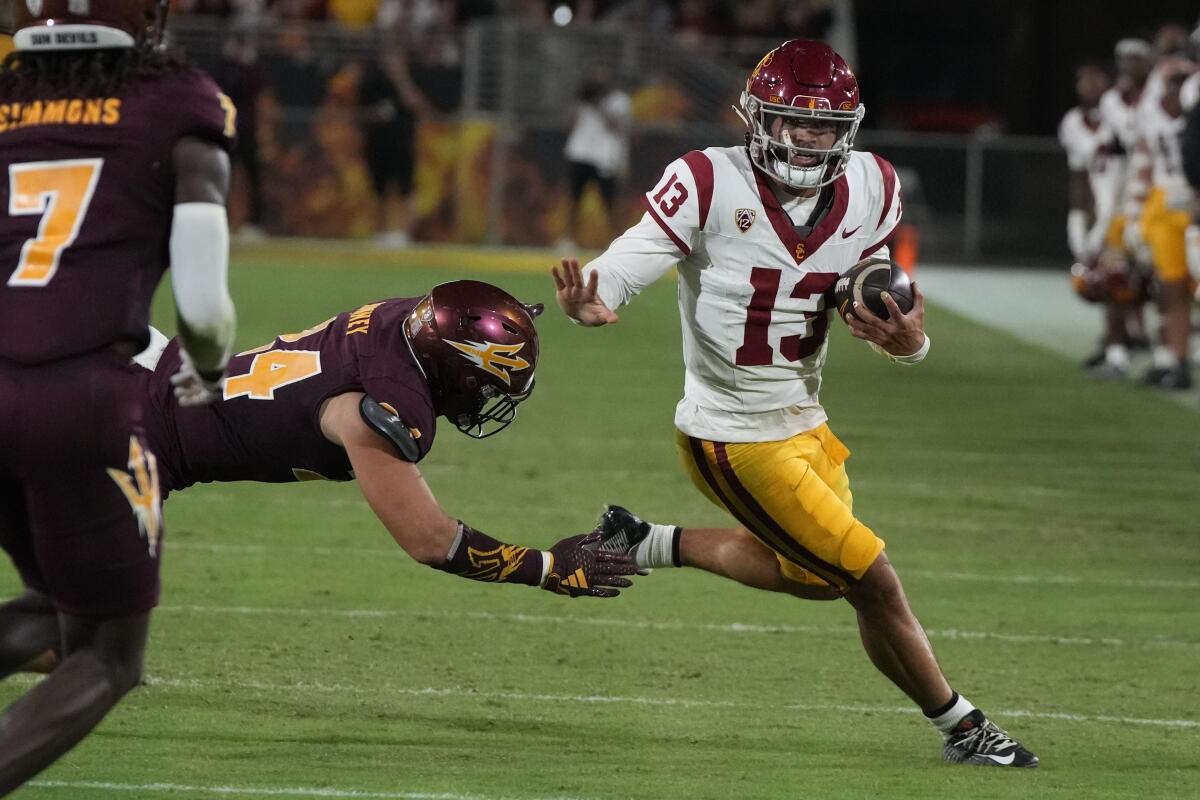Go beyond the scoreboard
Get the latest on L.A.'s teams in the daily Sports Report newsletter.
You may occasionally receive promotional content from the Los Angeles Times.

TEMPE, Ariz. — Through three weeks and three lopsided blowouts, USC grew accustomed to finishing its Saturdays in cruise control.
Caleb Williams, the Trojans’ Heisman Trophy winner, spent most of the team’s seamless second halves on the sideline, while freshmen and walk-ons took the field in the fourth quarter. Even USC’s much-maligned defense looked stout, shutting down the likes of San José State, Nevada and Stanford, the latter two of which it held to a combined 24 points.
It was impossible to know after those three weeks where USC actually stood. Was its defense better than expected? Was the offense actually unstoppable? Was this a College Football Playoff contender?
The true tests were expected to come sooner or later. Just not Saturday in Tempe.
It was far sloppier and closer than predicted, but No. 5 USC and Caleb Williams improved to 4-0 with a 42-28 road win over Arizona State on Saturday.
As the rest of the Pac-12’s contenders offered resounding statements of their strength — Oregon dominated Colorado, Washington wiped the floor with California, Utah stifled UCLA — USC‘s play raised more concerns about where its season is headed in a 42-28 win over Arizona State.
Chief among them is how their defense will hold up against those contenders, when it struggled at times to stop the Sun Devils, who hadn’t scored in six quarters coming into Saturday and were down to their third-string quarterback.
“We want the hard games,” linebacker Tackett Curtis said. “Nobody wants just the easy win — that’s what we live for, the hard games. We live for the pressure.”
The defense did show up in the fourth quarter Saturday, conjuring a pass rush when USC needed it most. Defensive tackle Bear Alexander halted a potential game-tying drive with a third-down sack. A strip sack from Solomon Byrd stopped the next possession. The Trojans added four sacks on a single drive to finally close the door.
“Finishing the game, we live on the mantra, the longer we go, the better we get,” said edge rusher Jamil Muhammad.
USC’s Max Williams will play against brother Macen and Arizona State on Saturday. Football has been a family affair for them, along with brother Marcelles.
Yet the only reason USC needed four sacks on a late drive to stop the Sun Devils was on account of the four plays of 13 yards or more it allowed in between.
That won’t fly against better Pac-12 offenses, starting next week in Colorado, where USC will face an explosive group that was just embarrassed on a national stage by the Ducks and will no doubt be out to prove itself again. The schedule doesn’t let up after that, either.
There’s still time to right the ship. USC had its worst showing last year in its first road game, narrowly escaping with a win at Oregon State. Perhaps the Trojans follow the same pattern this season.
But after its first real test, it was clear USC still has a lot to learn, and a long way to go before it can be considered a serious contender.

As his quarterback scrambled out of harm’s way and Brenden Rice turned the corner, streaking through the end zone past an unsuspecting safety, the USC receiver worried he’d have to slam on the brakes. No defender was near. A critical, fourth-quarter touchdown was within reach, but the sideline was also coming up fast.
Then again, after all the time they’d spent building their rapport, Rice knew not to doubt his Heisman-winning quarterback. Right on cue, Williams found him for a perfectly timed 29-yard touchdown that would finally put the Sun Devils away Saturday.
“As you can all see,” Rice said, “Caleb, his vision is amazing. He’s going to find you.”
Over USC’s first three games, Williams made a point to find just about every receiver on USC’s roster, spreading the wealth as much as possible. But as the Trojans receiver rotation began to whittle this week, Williams notably honed in on one wideout more than others.
Rice torched Arizona State for a career-high seven catches, 133 yards and two touchdowns, boldly staking his claim to be the Trojans’ top receiver, even if he wasn’t about to anoint himself.
Chip Kelly has failed to achieve a statement win at UCLA, but improvements on defense could make the Dante Moore-led Bruins a dangerous team very soon.
“I don’t think I’m just his favorite,” Rice said. “I think anybody can go ahead and take over at any moment.”
USC needed Rice to do just that on Saturday, and he answered the call. He more than doubled his season output in catches and yards, while USC’s previous leader in receptions — Mario Williams — struggled, dropping three passes.
Tahj Washington, who still leads the Trojans in receiving yards, was also quiet until the fourth quarter. He had zero catches until Williams found him for a 45-yard touchdown that had Arizona State finally waiving the white flag.
It was Rice, however, who led the charge among USC’s deep receiving corps. He might not always be at the front of the pecking order this season, not with so many wideouts vying for the ball, but Saturday made clear that his connection with Williams is certainly strong enough to count on. Especially when the pressure ratchets up on the road.

MarShawn Lloyd could envision the future a year ago, while watching from his couch in South Carolina. He wasn’t yet a part of USC’s rushing attack, but he could see how the pieces might seamlessly fit, from the offensive line to the backfield to the Heisman-winning quarterback.
That vision came to life in spurts Saturday night, as Lloyd, now USC’s lead back, had his best game for the Trojans, who desperately needed him to escape Saturday unscathed. While Williams and the passing game were largely inconsistent, Lloyd was a steadying force, rumbling downhill with reckless abandon. He finished with 154 yards in 14 attempts, averaging 11 yards per carry.
The only question lingering afterward about Lloyd was why he didn’t carry the ball more, as USCkept passing — and kept sputtering.
“We rode him pretty hard,” Riley said of Lloyd. “But, yeah, as good as he was running, you could argue we probably should’ve given it to him more.”
USC coach Lincoln Riley and Heisman favorite Caleb Williams have gotten off to a hot start, but bigger tests loom in the potent Pac-12.
It might not have seemed that way early, when Lloyd fumbled a handoff in the first quarter that handed Arizona State its first score, but he more than made up for it after that.
Lloyd finished with six rushes of 14 yards or more. After his fumble, he had just three more carries that were less than five yards.
His longest run went for 43 yards, after which Williams approached him with a message.
“Caleb, he was super excited for me,” Lloyd recalled. “He was like, ‘This is why you here,’ like, ‘this is the reason you’re here.’ ”

This was hardly a banner night for USC’s offense. Yet the Trojans scored 42 points on the road, racked up 535 yards and averaged almost nine yards per play, led by the most dynamic player in college football, who tallied five touchdowns on what was generally considered an “off night.”
Whenever USC snapped the ball, it reminded us how unstoppable its offense can be when it’s firing on all cylinders. Many of USC’s biggest offensive issues Saturday arose before the ball was snapped.
USC had four false starts, three of which came on its first two drives. The other left Williams writhing in pain as an errant snap struck him below the belt.
It was a feeling Riley could probably relate to when he watched his offense regularly struggle to get set and focused amid the rowdy road atmosphere.
How did the Pac-12 die? These surprising decisions by USC, Oregon, Washington and others thwarted efforts to save the conference.
“You get on the road and everything is magnified a little bit,” Riley said. “We were just a little tick off, especially offensively, in terms of just kind of moving. Play clock got down on us a lot, and we did not handle that well. We have to do a better job of preparing the guys for that.”
Riley said during the bye week that cutting down on penalties was a primary focus, with USC among the most penalized teams in college football through three weeks. Yet the Trojans ended up setting a season-high with 10 penalties on Saturday, several of which proved quite costly.
Asked what he attributed the influx of penalties to, Riley was frank.
“[Crappy] coaching,” he said.
Go beyond the scoreboard
Get the latest on L.A.'s teams in the daily Sports Report newsletter.
You may occasionally receive promotional content from the Los Angeles Times.